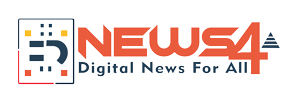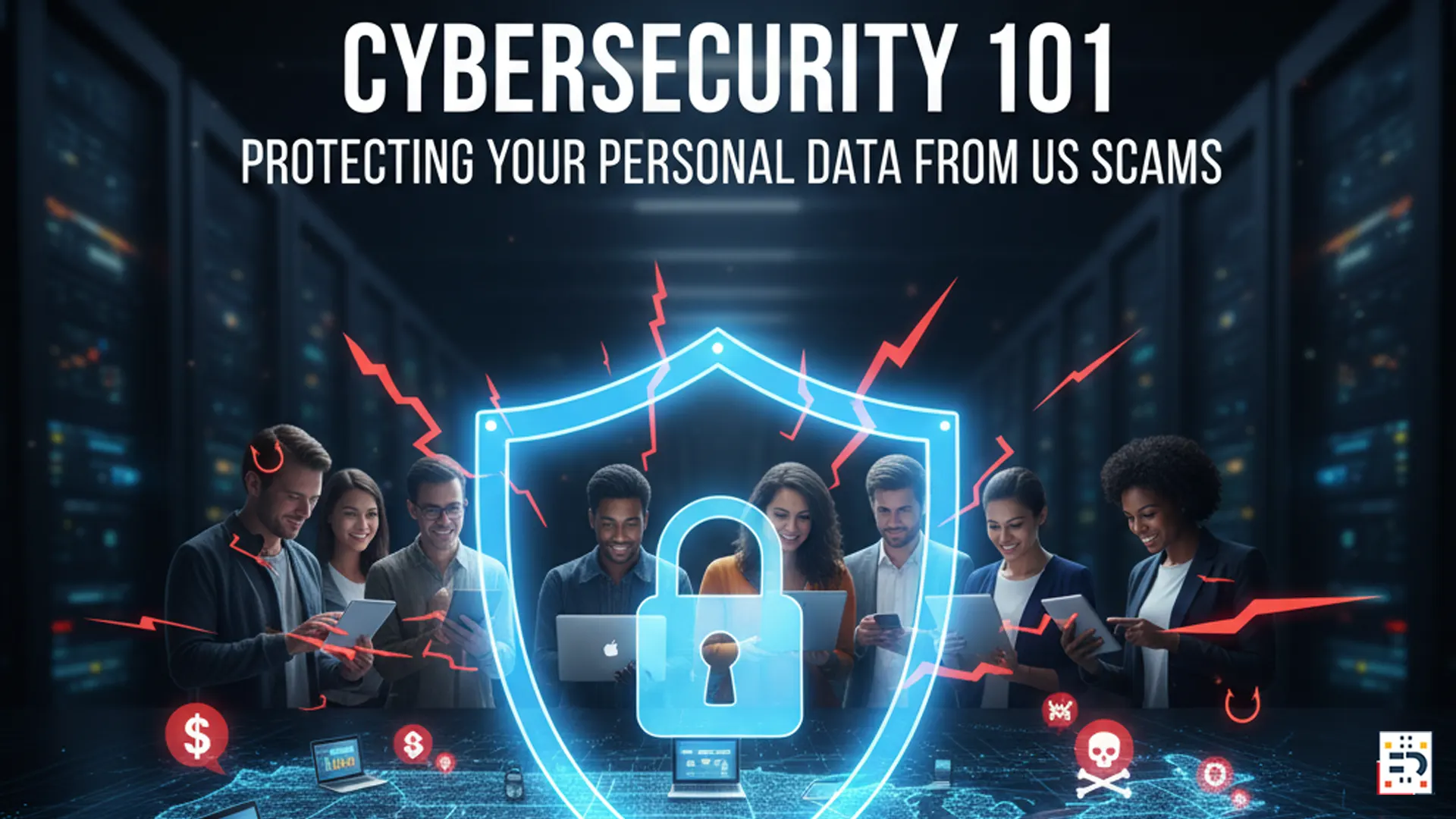In today’s hyper-connected digital era, cybersecurity isn’t just for tech professionals—it’s an essential life skill for every American. With cyber threats and online scams targeting millions of U.S. users, protecting your personal data has become a national priority.
According to the Federal Trade Commission (FTC), Americans lost over $12 billion to online scams in 2024, including identity theft, phishing attacks, and ransomware. This guide—Cybersecurity 101: Protecting Your Personal Data from US Scams—offers clear, actionable steps to safeguard your online presence from emerging digital dangers.
Understanding Cybersecurity and Its Importance
Cybersecurity is the practice of protecting networks, devices, and data from digital attacks. In the United States, as more people work remotely and shop online, the risk of data theft has skyrocketed.
Why cybersecurity matters for Americans:
- U.S. citizens are prime targets due to high online banking usage.
- Digital payment apps like Venmo, PayPal, and Cash App attract scammers.
- Healthcare, education, and small businesses are increasingly vulnerable.
Learn more: CISA Cybersecurity Basics — U.S. Cybersecurity and Infrastructure Security Agency (CISA) offers free resources for individuals and businesses.
The Rising Tide of US-Based Cyber Scams
Scam Trends Affecting Americans
Cybercrime in the U.S. has become more sophisticated, leveraging technology and social engineering to trick victims.
Common scams include:
- Phishing and smishing (SMS-based scams)
- Fake tech support calls impersonating Microsoft or Apple
- IRS and tax refund scams targeting U.S. taxpayers
- Investment scams using fake crypto or stock platforms
According to FBI’s Internet Crime Complaint Center (IC3), more than 800,000 complaints were filed in 2024, making the U.S. one of the most targeted countries for online fraud.
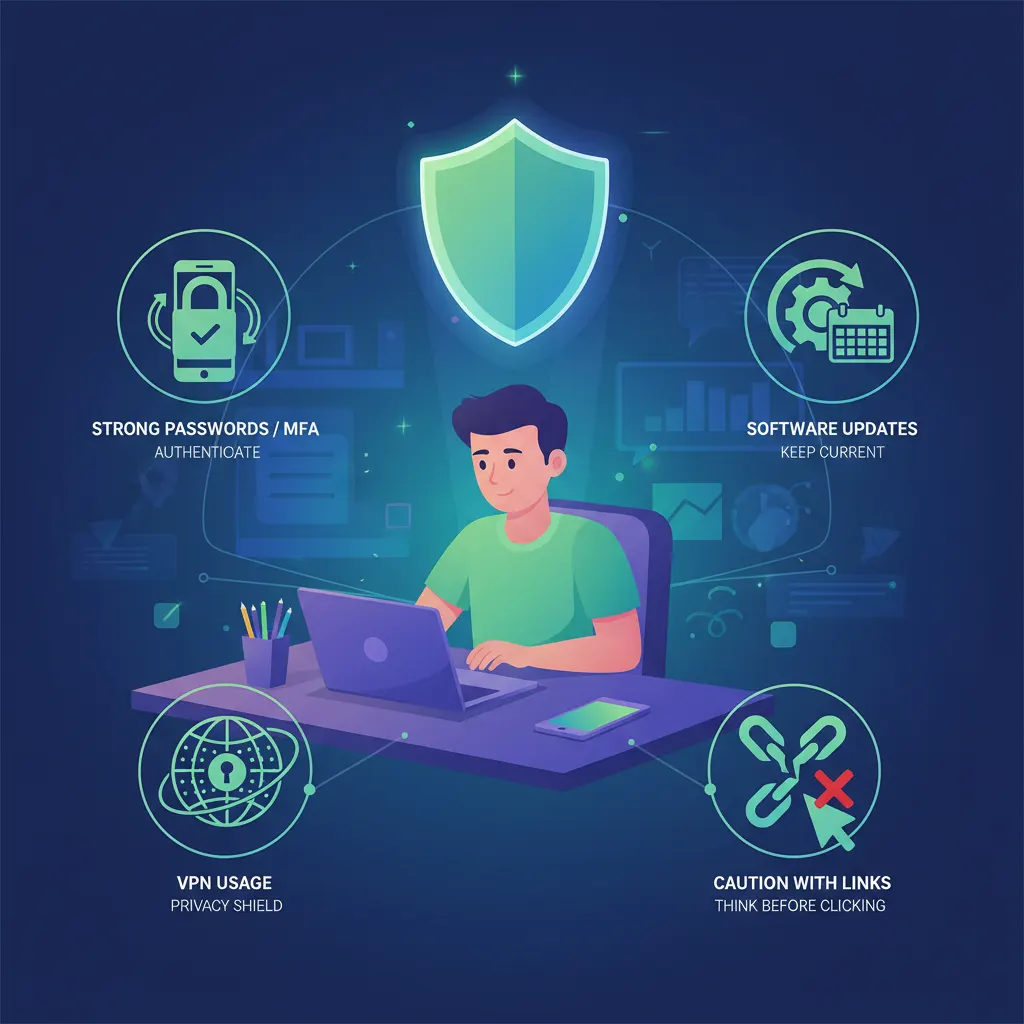
Why Personal Data Is So Valuable to Cybercriminals
Your personal data can be worth thousands on the dark web. U.S.-specific data—such as Social Security Numbers (SSNs), driver’s licenses, and bank credentials—are highly sought after by hackers.
Hackers use your information to:
- Apply for credit cards or loans in your name
- File fake unemployment or tax claims
- Gain unauthorized access to your healthcare or insurance accounts
Tip: Visit IdentityTheft.gov to report and recover from identity theft in the U.S.
Common Types of US Cyber Scams Targeting Individuals
Phishing Attacks and Email Scams
Phishing remains the top cyber threat in America. Emails may appear to come from U.S. banks like Chase or Bank of America, asking users to “verify” information.
Always check the sender’s domain and never click suspicious links.
Social Media Scams and Fake Profiles
U.S. social networks—especially Facebook, Instagram, and LinkedIn—are popular targets for scammers creating fake business pages or profiles.
Verify all promotions, contests, and “investment offers” before responding.
Online Shopping and E-commerce Scams
Fake e-commerce sites with “.us” domains have surged. They mimic real American brands but sell counterfeit or nonexistent products.
Before you buy, confirm that the site uses HTTPS and check the Better Business Bureau (BBB) at bbb.org.
Tech Support and IRS Impersonation Scams
Fake “Microsoft Support” calls are rampant across the U.S., as are scammers pretending to be IRS agents.
Remember: The IRS never contacts you by phone or email demanding payment.
How Cybercriminals Steal and Use Your Data
Cybercriminals use technical and psychological tricks to access personal data from unsuspecting Americans.
The Role of Malware and Spyware
U.S. users often encounter malware hidden in fake “security updates” or “prize claim” emails. Once installed, these programs collect financial and personal information silently.
Protect yourself by:
- Using antivirus software like Norton 360 or Bitdefender US Edition
- Avoiding pirated software or suspicious downloads
- Regularly scanning your devices for threats
Identity Theft and Its Consequences
Identity theft in the U.S. can lead to:
- Lost credit reputation
- Frozen bank accounts
- Unauthorized loan approvals
Visit Consumer.gov Identity Theft Protection for free American resources on data security and fraud prevention.
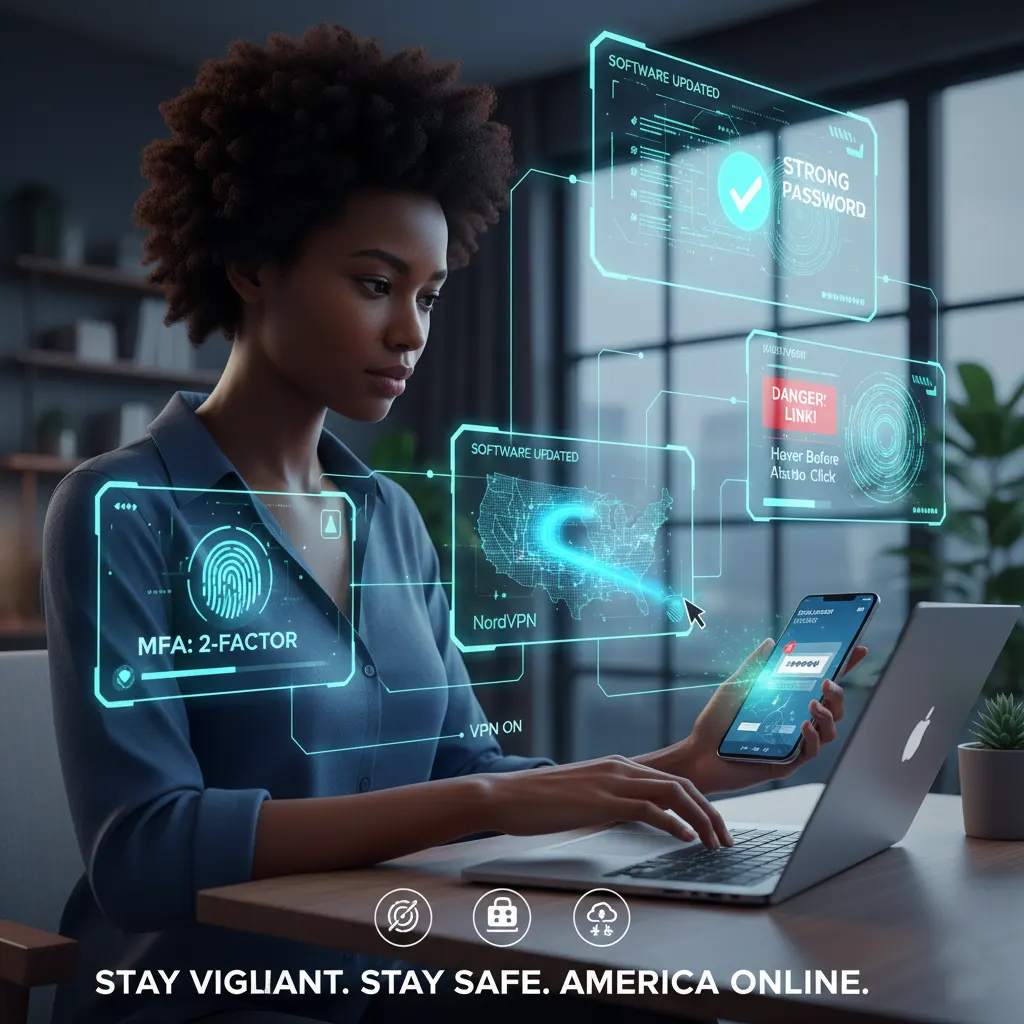
Essential Cybersecurity Practices for Everyday Americans
1. Use Strong Passwords and MFA
Every U.S. security expert recommends multi-factor authentication (MFA). It blocks 99% of account hacks by requiring a secondary code or fingerprint verification.
2. Keep Software Updated
Ensure your Windows, macOS, or mobile apps are always current. Many U.S.-based breaches exploit outdated versions of browsers or payment software.
3. Avoid Public Wi-Fi Without a VPN
Using free Wi-Fi in U.S. coffee shops or airports can expose you to hackers.
Protect yourself using a VPN service such as NordVPN USA or ExpressVPN.
4. Be Cautious with Links and Attachments
Fake emails often mimic American brands like Amazon, UPS, or FedEx. Hover over links before clicking to verify their destination.
5. Encrypt Your Data
Use U.S.-trusted encryption tools such as VeraCrypt or ProtonDrive to secure sensitive files and backups.
Legal Protection and Government Efforts Against Cybercrime in the U.S.
Federal and State-Level Protection
- Federal Trade Commission (FTC) — Handles consumer fraud and data protection complaints.
- Cybersecurity and Infrastructure Security Agency (CISA) — Guides U.S. citizens and businesses on digital safety.
- FBI Internet Crime Complaint Center (IC3) — Investigates online fraud cases.
Report scams directly via ReportFraud.ftc.gov or IC3.gov.
State Cybersecurity Laws
Many U.S. states—like California and New York—have enacted data privacy laws that give residents more control over their personal information.
For instance, the California Consumer Privacy Act (CCPA) allows residents to request companies delete or not sell their data.
Tools and Software for Personal Cybersecurity
| Category | Recommended Tools (US-Compatible) | Purpose |
|---|---|---|
| Antivirus Software | Norton 360, McAfee, Bitdefender | Blocks malware and ransomware |
| VPN Services | ExpressVPN, NordVPN, ProtonVPN | Encrypts your internet connection |
| Password Managers | 1Password, Dashlane, LastPass | Stores and generates strong passwords |
| Ad Blockers | uBlock Origin, AdGuard | Prevents malicious ads and trackers |
| Cloud Backup Tools | Google Drive, iCloud, Dropbox | Protects against data loss and ransomware |
For reviews of top-rated U.S. cybersecurity tools, visit PCMag Security Reviews.
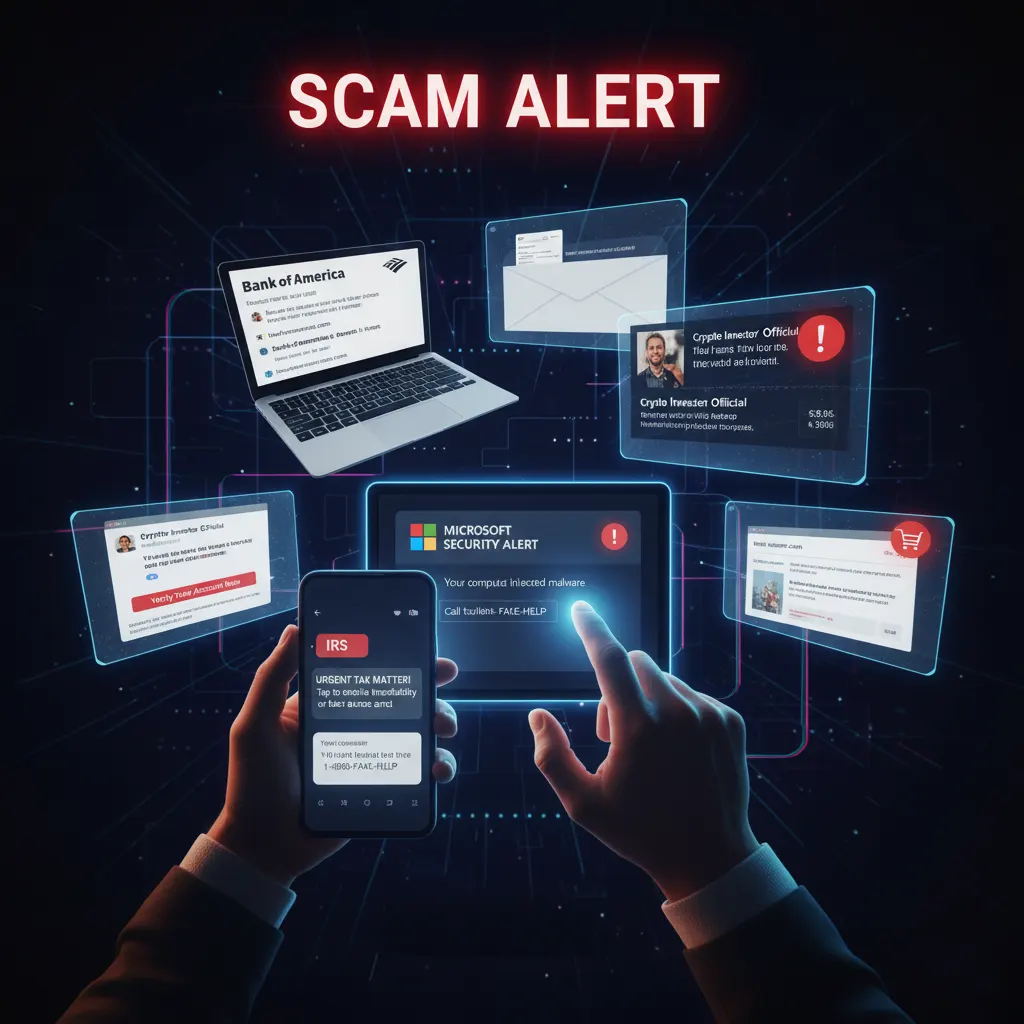
The Future of Cybersecurity in the United States
Emerging technologies are reshaping America’s cybersecurity landscape. Artificial Intelligence (AI) now detects phishing attempts before users even see them.
Other upcoming trends include:
- Biometric logins for online banking
- Quantum encryption for sensitive data
- AI-driven fraud detection for credit and e-commerce systems
These advancements, combined with education and awareness, are key to making America safer online.
Frequently Asked Questions (FAQs)
1. How can I protect my online banking accounts in the U.S.?
Use MFA, avoid saving card details on browsers, and enable fraud alerts from your U.S. bank.
2. Are VPNs legal in the United States?
Yes, VPNs are 100% legal in the U.S. They are encouraged for online privacy and security.
3. What’s the safest way to shop online?
Buy only from HTTPS websites, check return policies, and review ratings on BBB.org or Trustpilot US.
4. How do I know if my data was leaked?
Use HaveIBeenPwned.com to check if your email appears in known U.S. data breaches.
5. Can the FBI help with online scams?
Yes, report incidents to the Internet Crime Complaint Center (IC3) for federal investigation.
6. How can small businesses in the U.S. boost cybersecurity?
Follow CISA Small Business Guidance for tailored advice.
Staying Vigilant in a Digital World
Cybersecurity in the United States is a shared responsibility. Whether you’re banking, shopping, or working online, every digital action carries some level of risk.
By following simple safety measures—like using MFA, VPNs, and encryption—you can drastically reduce your vulnerability to U.S.-based scams.
Always stay informed, rely on trusted American cybersecurity resources, and remember:
“The best defense against cybercrime is awareness.”
#Cybersecurity101 #DataProtection #OnlineSafety #USScams #CyberAwareness #IdentityTheft #CyberSecurityTips #PrivacyProtection #StaySafeOnline #DigitalSecurity #CybercrimePrevention #USCybersecurity #ProtectYourData #ScamAlertUSA #InternetSafety
